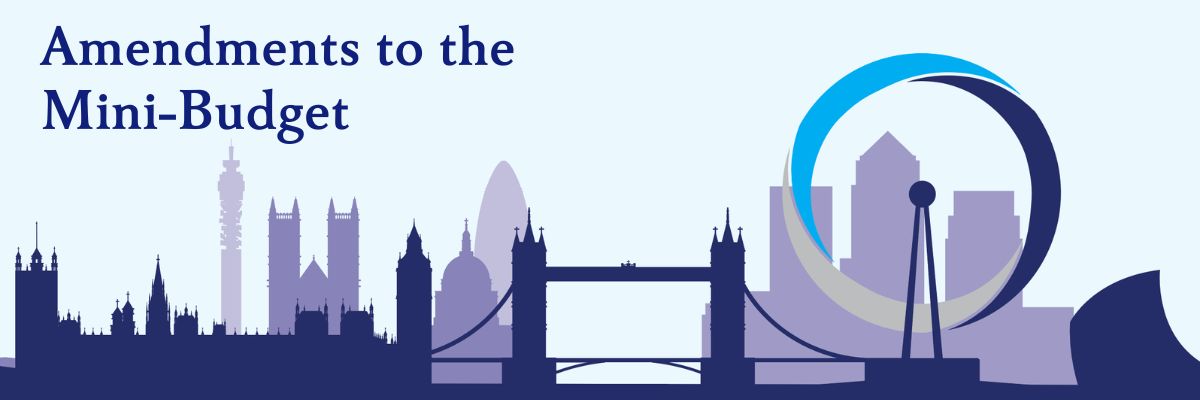Mini-Budget: the new Chancellor’s amendments

Information correct as of 18 October 2022
Yesterday the new Chancellor, Jeremy Hunt, made an “emergency tax statement” that reversed almost all of the tax cuts that had been announced in Kwasi Kwarteng’s mini-budget of 23 September 2022. He also signalled possible future changes to the government’s energy support packages for businesses and households.
Our original article on the mini-budget can be found here. The key measures surviving are the changes to Stamp Duty Land Tax (SDLT) thresholds and the cut to National Insurance due on 6 November. The new announcements and changes are as follows:
Personal
National Insurance Contributions NICs: this will remain as per the mini budget announcement. The Health and Social Care Levy, which took effect in April 2022 will no longer apply as of 6 November 2022.
Income Tax Basic Rate Band: the planned 1% cut in the basic rate of income tax from April 2023 has been scrapped. The basic rate of income tax will therefore remain at 20% indefinitely.
Additional Rate Tax Band: the 45% income tax rate for higher earners will remain in place NOTE: this change was announced on 3 October 2022.
Dividend Tax Increase: The 1.25 % increase, which took effect in April 2022, will now remain in place.
Stamp Duty Land Tax (SDLT): the changes to SDLT thresholds that took effect immediately after the mini-Budget remain. The current nil rate band of £125,000 has been doubled to £250,000 in England and Northern Ireland for all home purchases. For first time buyers the nil rate band has increased from £300,000 to £425,000. The maximum value of a property on which first-time buyers’ relief can be claimed is now £625,000.
Energy Price Cap: the “energy price guarantee” on the price of energy units (kWh), from 1 October 2022 will continue as previously announced until April 2023. The Government will launch a treasury-led review of the scheme after April 2023.
Energy Bill Discounts: the discount scheme announced in the mini budget will continue until April 2023. The Government will launch a treasury-led review of the scheme after April 2023.
Universal Credit: the changes made to the increase to Administrative Earnings Threshold (AET) and also the strengthening the Universal Credit (UC) sanctions regime remain as per the mini-budget.
Alcohol Duty: the planned freeze in Alcohol Duty rates from 1 February 2023 has been cancelled.
Business
Energy Bill Relief Scheme (EBRS): the details of the energy price cap for businesses and other non-domestic energy users will remain as per the mini-budget.
Corporation Tax Rate: on the Prime Minister had already announced on 14 October 2022 a reversal to the planned corporation tax rate change. The main rate of corporation tax will now increase from 19% to 25% from 1 April 2023.
Annual Investment Allowance: the Annual Investment Allowance will be set at a permanent level of £1 million as per the mini budget announcement.
VAT Free Shopping: the introduction of a new digital scheme to allow for VAT-free shopping by visitors to the UK is to be scrapped.
Off-Payroll Working Reforms (IR35): the 2017 and 2021 reforms to the off-payroll working rules (also known as IR35) will remain in place and not repealed from April 2023.
Seed Enterprise Investment Scheme (SEIS): the increases to the limits for SEIS announced will remain. From April 2023, companies will be able to raise up to £250,000 of SEIS investment, a two-thirds increase. To enable more companies to use SEIS, the gross asset limit will be increased to £350,000 and the age limit from 2 to 3 years. To support these increases, the annual investor limit will be doubled to £200,000.
Investment Zones: the introduction of investment zones and associated tax incentives announced in the mini budget will remain.
As always, the information outlined above is for general guidance purposes only. We appreciate that every individual and business has different circumstances and you should always seek appropriate professional advice before you act on any of the information provided.
If you would like more information on any area referred to in the mini-budget or require wider business guidance, please do get in touch with your GWA Partner.


